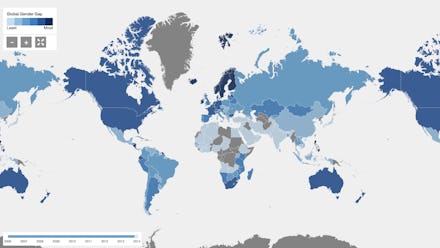How Well Does Your Country Treat Women? Check This Interactive Map

The news: It will take the world at least 81 years for the gender gap to close, according to a Global Gender Report released Tuesday by the World Economic Forum.
The annual report examines the relative disparities between men and women in health, education, economy and politics. Some countries fared better than others in its rank of women's educational attainment or economic participation. Yet one glaring fact puts the meticulously crafted rankings into context: There is no country in the world where a woman earns as much as a man.
Source: World Economic Forum
How was the gender gap measured? The World Economic Forum began tracking the progress of countries in 2006 and for each report, polled CEOs around the world about their employees' salaries. Though no single measure captures the state of gender-based disparities, the rankings reveal the pace of progress in both developed and emerging economies.
"Much of the progress on gender equality over the last 10 years has come from more women entering politics and the workforce," report author Saadia Zahidi told the Associated Press.
Top 10 Most Gender Equal Countries in the World
Top 10 Most Gender Equal Countries in Latin America
Top 10 Most Gender Equal Countries in Asia and the Pacific
How can the world close the gender gap? The long-term solution, some experts say, is simple: improve girls' access to education. Investments in educational attainment has accounted for about half of the economic growth in the twenty countries of the Organization for Economic Cooperation and Development.
"Educating girls contributes significantly towards them growing up into strong, educated, progressive women who can and will raise their own children in a more gender-balanced manner," Utsav Shakya, a World Economic Forum's Global Shaper in Nepal writes.
Others argue that expanding women's participation in politics will also help close the gap.
"We should set aside a certain number of seats for women, based on and proportionate to the percentage of women in the population of the country in question," suggests Anoosha Shaigan, a lawyer in Lahore and member of the Youth Parliament in Pakistan.
Though there is no one-size-fits-all solution, each country should strive to make progress. After all, gender equality isn't just good for society, it's good for nations as well.